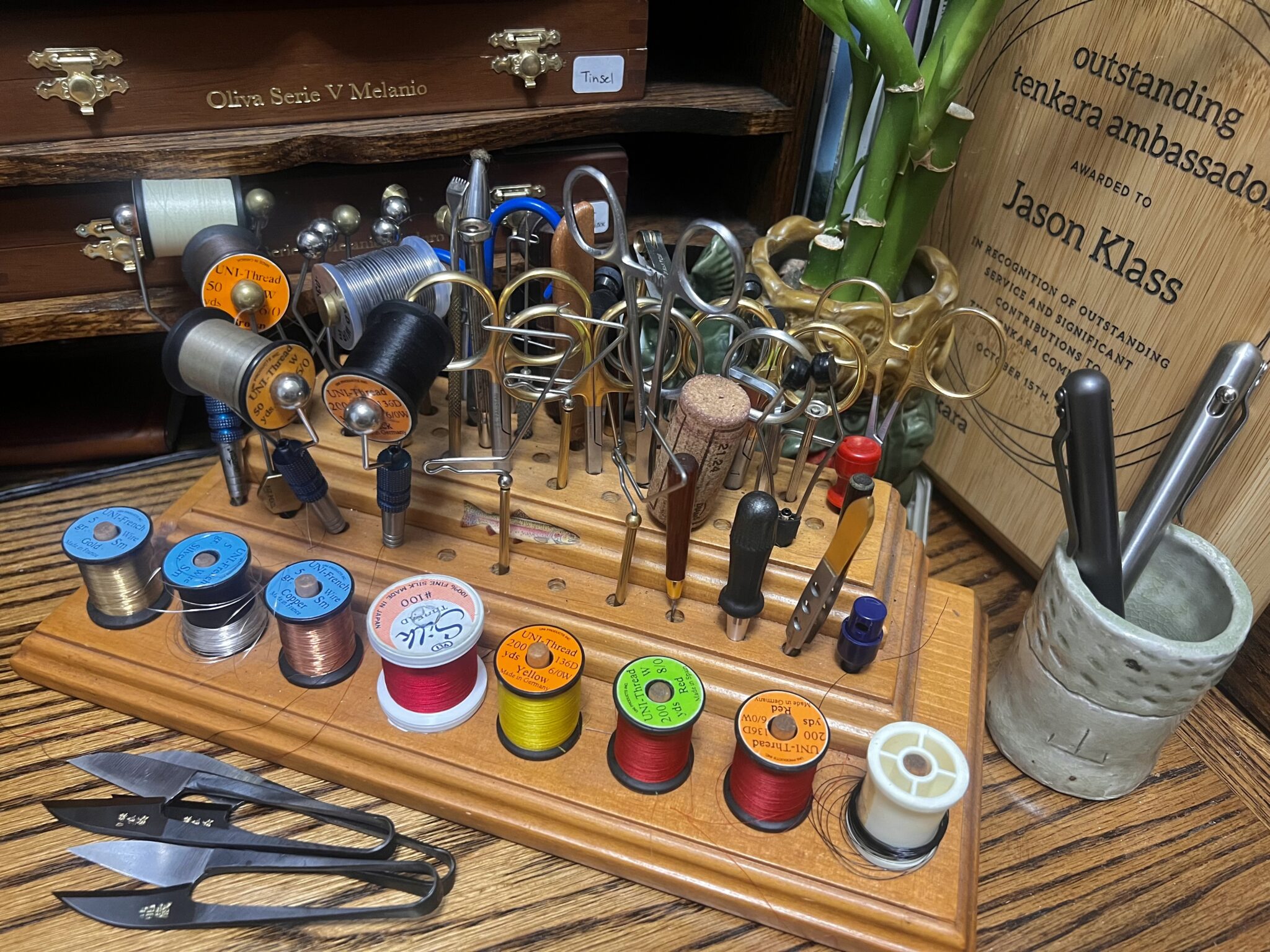
This article is inspired by a recent post on Tenkara Angler entitled “The Unsuspecting Minimalist and a Review of Sorts” by Anthony Naples.
It was a few years ago at one of the Tenkara Summits. I was giving a tying demo and had my tools and vise laid out at the table. As I was preparing my materials, a small crowd gathered around and I could hear someone behind me commenting on my tool caddy (the very one in the photo), saying, “so much for tenkara being simple!”
It’s in situations like these where I find myself conflicted. Should I unleash a verbal evisceration? Or should I bite my tongue and be diplomatic? Regrettably, I chose the latter.
American pop culture seems to have little appreciation for nuance. It likes things bifurcated, clear cut–it’s either “this” or “that”, and anything else is a contradiction.
What this person failed to recognize is that the amount of tackle one owns is not what determines or undermines the implied “sanctity of simplicity”. It’s what they take on the stream and how they participate in the sport–their appreciation for a more direct connection to the river and the fish without distraction. It’s not the number of material possessions, nor the love of them!
If you’re wet wading in sandals, fishing with one rod, one line, and one fly, but have 45 rods, 16 fly stuffed fly boxes, 30 lines, 3 pairs of waters, 2 turtle doves, and box full of tippet spools at home, does that mean you’re somehow NOT the S-word‽ Egads!
The other thing this person wrongly assumed is that since I happen to be giving a tenkara-specific demo in that moment, that, surely, that must mean I only fish tenkara and tie tenkara flies. He couldn’t possibly imagine that I also tie saltwater, salmon, streamer, and dry flies that require tools in different sizes, or with different functions for specific applications. It was inconceivable to him. He sure extrapolated a hell of a lot of information from a 5-second observation!
And so what if it (gasp) isn’t simple? What’s wrong with that? Perhaps most people find the simplicity of tenkara appealing, but others might find appeal in making it more complex. The word “complex” doesn’t have an intrinsically negative connotation–only contextual. So why is it used that way in tenkara so often? It’s almost become a passive aggressive hashtag. #notsimple
Like Anthony, simplicity wasn’t what initially attracted me to tenkara. I was specifically looking for backpacking rods to sell in my online store. At the time, I thought I’d use tenkara solely as a backpacking rod, never as my primary method.
What ultimately sold me on tenkara was that it was perfectly suited for the high-gradient, pocket-water streams I fish which are similar to many Japanese watersheds. All romance and tradition aside, from a purely technical angle, tenkara is just easier, more efficient, and (in my opinion), more fun!
I never took an oath to simplicity or any particular style of tenkara, again like Anthony, the appeal of it snuck up on me. And stuck!
What was it about tenkara that sold you?








Simple is as simple does. If you think about it, almost any human endeavor worth doing is a relatively complex behavior. Tenkara is no exception. To have fun and have even modest success requires planning, preparation, practice, and, at a minimum, selecting and acquiring a rod, line, tippet and kebari — all of which are products of modern industrial technology, for better or worse. Within each of these basic requirements, there are myriad combinations of possibilities. Not really that simple, is it? Add in actually making shit yourself — like kebari and lines – and even more choices and factors come into play, so, yeah, the materiel will accumulate a bit. That said, simplicity is one of the things that attracts me to tenkara, in that it is possible to succeed and have fun on the water with a minimal kit, that can be small, light, and easy to carry anywhere. This is largely a matter of personal choice: how much and what do you want to take on your visits with the fish? Do it a while, and you’ll find out where you land. The barest essentials for tenkara are in fact more simple than Western fly fishing, but need not be. After doing this a while, I have sweated my full “heavy” kit to a small chest pack, two rods, a water bottle, one kebari box and one box of Western dry flies, one spool of tippet, 2 to 4 lines of different lengths and types on small saucer spools, forceps, nippers, a tiny hook releaser, a collapsible wading staff, and a net. I can hike for miles into an area, fish all day, and have everything I need on board, even if something breaks, I encounter vastly different conditions or decide to target different species. That sounds like a lot, but compared to a Western flyfisher’s kit, it isn’t all that much. Two or three pounds excluding the H2O. If I am camping by a spot, I often take on a session only a minimal kit — one rod, a Tenkara Path spool of my line of choice (with extra kebari in the magnetic holders), tippet, and nippers. All but the rod fits in a pocket. So I guess I’d say that tenkara offers a real possibility of minimalism, but does not require it. Because this activity has an inherent baseline of unavoidable complexity, I don’t consider minimalism a worthwhile goal in itself. Simple is as simple does.